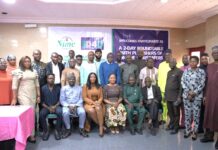Fact-Checking in an Age of Smart Technologies
By Inyene Ibanga
TECH DIGEST – Fake news has always been an integral part of every society. The emergence of the mobile phone or the smart phone has made it very easy for individuals to browse and access the internet while on-the-go. The collection, processing and distribution of information is easier to access through the speed and power of technology.
As the world continues spinning around information about political and social upheavals every day, it is becoming increasingly difficult to distinguish between fact and fiction circulating in the name of news.
With the influx of smart phones, there is a massive volume of news in circulation, seeking to grab the attention of subscribers on traditional media and social media. Digital news portals cover virtually all areas of human endeavour. It is within this setting that the dissemination of fake/false news continues to thrive.
The negative impact of fake news resonates across every part of the world because, when not promptly addressed, it has resulted in deaths, the escalation of conflict, political hostility, social panic, among others. It is no longer about informing, educating, and entertaining through the actual representation of events backed by facts.
Smart phones come with advanced functionality beyond the making of voice calls and sending messages, and now include the capability to relay and transfer audio, video and pictorial materials. Such media posted from one location on the globe is accessed in real time anywhere on planet earth, so long as internet connectivity is available.
Consistently, all manners of news are being churned out to attract, persuade, convince and influence millions of receivers to support a particular position or trend being canvassed by the promoters of the those messages. In the process, fake news has saturated the internet as it competes for the attention of worldwide audiences.
Today, smart phone users are daily bombarded with news, sometimes irrelevant and unsolicited, flashing through with messages that span the important, frivolous, and even mundane information every second. There is no escaping the ubiquitous stream of news rushing into smart phones.
Before I go forward, take a good look at the smart phone in your hands and imagine what it is capable of doing to stem the menace of fake news.
Read Also:
Could you do yourself the favour of taking a moment to verify that juicy, hot latest news before pressing the ‘share’ or ‘forward’ button on your smart phone?
Now, you’re wondering how to verify the authenticity or otherwise of the volume of news constantly pouring into your smart phone?
Please, don’t misunderstand me. I’m not out to judge you but your conscience might be urging you to do the needful by fact-checking that stuff before your finger gets the best of you.
Fact-checking applications are readily available for use in smart phones to verify stories, audios, pictures, videos and documents flying around the internet. Users can install such apps for free to facilitate the verification of contents on the internet.
It is necessary for smart phone users to exercise caution as they surf the internet for contents that align with their interests. Even then, the internet has the capability to search on your behalf without any prompting from you. Artificial Intelligence (AI) technology collects and pushes out all the information on the basis of your previous searches.
I strongly believe that Nigerian tech innovators should be encouraged to deploy their creative energies to curb the problem of fake news. It is expected that our young innovators would take up the challenge of developing innovative applications to enable smart phone users fact-check every bit of information that comes their way.
Citizens are looking forward to fact-checking apps that would enable them determine the veracity and sincerity in the comments issued by political, religious, community leaders and other influential stakeholders. With the help of such fact-checking apps, Nigerians would be able to hold political leaders to account for the false promises made during electioneering campaigns.
This way, transparency and accountability would be greatly enhanced as religious and political leaders may just learn to match their promises with action by providing accurate and credible information at all times. Responsible and responsive stewardship would be visible at all levels of public service to promote good governance.
This could just be the chance for the National Centre for Artificial Intelligence and Robotics (NCAIR) commissioned by NITDA to motivate young innovators to develop indigenous fact-checking apps for the population of smart phone users. With that Nigeria can start reining in on fake news, which is fast becoming one of the greatest sources of concern in the country these days.
Inyene Ibanga is Managing Editor TechDigest and writes from Wuye District, Abuja.



















